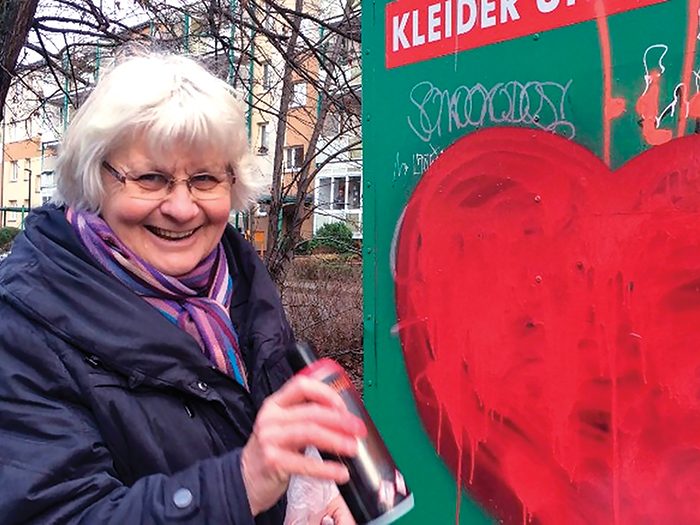Good News
Some of the positive stories coming our way

Scrubbing out hate
Society Visiting cities all over Germany, 71-year-old Berliner Irmela Mensah-Schramm (pictured) spends several days a week searching for banned Nazi symbols and anti-immigration slogans, which she then erases. In her bag, she carries red paint, nail polish remover and a scraper. If she sees a painted swastika, she turns it into a red heart instead.
Her mission started 31 years ago, when she was shocked to discover a sticker at her local bus stop calling for the release of Nazi war criminal Rudolf Hess. Finding it still there on her way home, she scraped it off with her keychain. Over the next three decades, she continued to take action against neo-Nazi propaganda, removing more than 130,000 offensive signs and stickers.
Her work is not without risks: she’s been assaulted a few times and last year was threatened with a €1,800 fine for defacing public property.
But she is unrepentant. “I’m really concerned by this hate propaganda. And I want to take a stand,” she says. “Freedom of speech has limits. It ends where hatred and contempt for humanity begin.”
Batteries: A nuclear approach
Science A team of scientists at Bristol University in the UK have come up with an idea that could solve some of the problems of nuclear waste, clean electricity generation and battery life. It involves combining a man-made diamond with a radioactive field, which then generates a small electrical current.
“We can turn a long-term problem of nuclear waste into a nuclear-powered battery and a long-term supply of clean energy,” says Professor Tom Scott.
The plan is to utilize the technique with carbon-14 from graphite blocks used in nuclear-power plants. It will reduce their radioactivity, lessening the challenge of storing them safely, while the carbon-14 extracted can be incorporated into a diamond to produce a nuclear-powered battery that will take more than 5,000 years to lose even half its power.
Swedes encouraged to repair
Tax Since the beginning of the year, Swedish consumers have benefited from tax breaks on repairs to everything from bicycles to washing machines. The move is the brainchild of government minister Per Bolund. “There is a shift in view in Sweden at the moment,” he explains. “There is an increased awareness that we need to make our things last longer in order to reduce materials’ consumption.”

Exposing wage slavery
Heroes As a Cameroonian studying in Italy, Pierre Yvan Sagnet needed to make some money. A friend suggested tomato-picking—and this was how he came to experience the notorious “caporalato” system under which farm owners exploit seasonal workers. Workers would put in 16-hour days for wages of 20-25 per day, from which the price of water and sandwiches would be deducted. Sagnet was outraged and organized a strike among fellow workers, which resulted in better pay and conditions—and a new law criminalising the practice. “Here, in the heart of Europe, I have seen human beings stripped of every last scrap of dignity,” he recalls of his time in Nardo, in the heel of Italy. In recognition of his work, the 31-year-old has now been named a Knight of Italy’s Order of Merit.
Sources: Society: The Independent, 19.12.2016. Science: Good News Network, 6.12.2016. Tax: The Guardian, 19.9.2016. Heroes: BBC News, 4.1.2017



